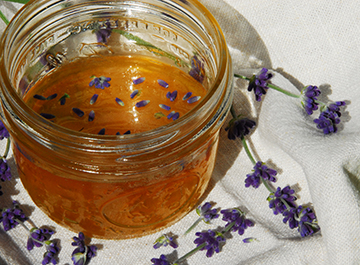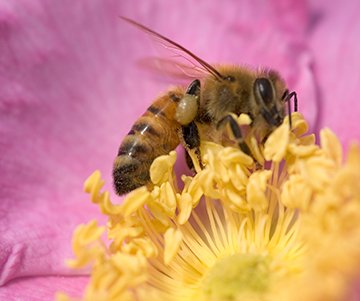Spring allergy season may seem like a distant glimmer on the horizon, especially if there’s still snow outside your window.
But, if you suffer from seasonal sniffles, you can actually start preparing now for a more peaceful encounter with pollen.
How?
Before the world bursts into bloom and sends you sniffling your way to the tissue box, be sweet to yourself and start indulging in a daily dose of honey.

Pesky (and sometimes paralyzing) pollen allergies arise because of continuous over-exposure to the same plants. When honey bees collect pollen from the flowers of these plants, trace amounts of the pollen ends up in the honey that the bees create.

So, when you eat honey that is produced in your local area, you consume tiny bits of the very pollen that causes problems. In this way, your body becomes accustomed to dealing with it gradually, which boosts immunity.
According to allergy expert Tom Ogren, “In honey the allergens are delivered in small, manageable doses and the effect over time is very much like that from undergoing a whole series of allergy immunology injections. The major difference though is that the honey is a lot easier to take and it is certainly a lot less expensive.”
Many conventional doctors refute the power of honey to ease allergy symptoms, but there are studies and countless personal experiences that point to the contrary.
“I started to get allergies symptoms at the age of 40,” writes Mark from New Jersey. “After five years of severe sinus infections … I had sinus surgery in 2007 and still got allergy symptoms seven months out of the year. I stopped taking medicine for two years and started taking honey and bee pollen (from a local bee keeper) daily. This past year, I had watery eyes and sneezing on two separate days, and that was it. The medical folks say it doesn’t work. I’m going to keep doing it, ’cause it’s working for me.”
If you’re highly allergic to local pollens and haven’t tried eating raw, local honey, start slowly. Try just a fraction of a teaspoon and see if you feel any reaction (itching, watery eyes, etc.).
Everyone else can take a teaspoon or two each day for six weeks (or more) before allergies are due to strike.





















































I know this works from personal experience, too. I can breathe all through the allergy seasons. And who doesn’t love the taste of honey?
Here in Florida, we are in the thick of pollen season and I have been increasingly reactive over the past few years. My Dad used to eat honey with honey comb every morning on his cereal for help with allergies. We all thought he was just using that as an excuse because he liked honey but your article here makes me wonder. Would it still help to eat honey every day if you are already in the throes of pollen and sniffling away? I have a jar of honey from a local watermelon grower just sitting in my cabinet. I think I will just open her up and see if things get better over the next year? It can’t hurt.
I’m a beekeeper! Thank you. Great article!
No doubt in my mind that this does indeed work!
What a great tip to share for those who weren’t aware of this.
Thank you!
My husband and I both have developed allergies since we moved to Prescott Valley, Arizona. As everyone we have talked to has said the same thing. We have a local Honeyman store here in Arizona. He carries all kinds of honey. Don’t know which kind to buy. Is there anybody out here that uses honey for allergies problems in the state of Arizona? Allergies here are at very high levels.